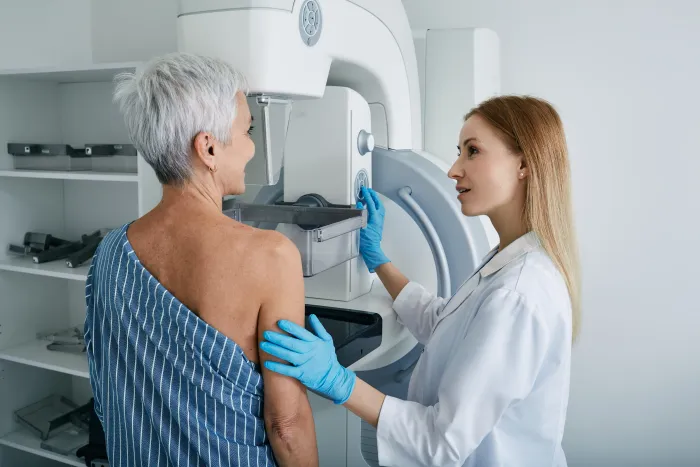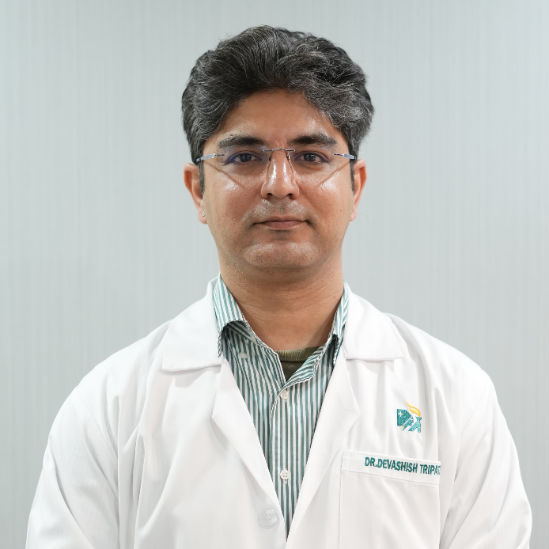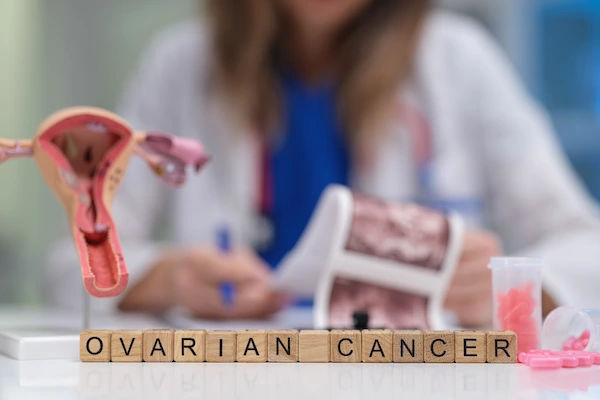Signs of the Most Common Cancers in Women
Learn the early warning signs of the most common cancers in women, including breast, cervical, ovarian, uterine, lung, colorectal, thyroid, and skin cancers. Understand what symptoms matter, when to seek medical advice, and how timely screening can save lives.

Written by Dr. Md Yusuf Shareef
Reviewed by Dr. Dhankecha Mayank Dineshbhai MBBS
Last updated on 13th Jan, 2026

Introduction
Catching cancer early often makes treatment simpler, less invasive, and more effective. Yet many women are unsure which signs matter or when to see a doctor. This guide breaks down the cancers most frequently affecting women and the symptoms that should not be ignored — from breast and gynaecologic cancers to colorectal, lung, thyroid, and skin cancers. You’ll find practical screening advice, risk factors you can change, and clear guidance on when to take action. Women often minimise symptoms because of busy lives and responsibilities; knowing what is “normal” and what requires attention can be life-saving. If symptoms persist beyond two weeks, consult a doctor online with Apollo24|7 for assessment and next steps. Apollo24|7 also offers convenient home collection for common lab tests and can assist with imaging or specialist referrals when required.Consult a Top Oncologist for Personalised Advice
Why Early Signs Matter (and What Counts as a Red Flag)
Early detection greatly improves cancer outcomes.
A red-flag symptom is new, unusual, persistent (two weeks or more), or worsening.
What counts as a red flag?
• Sudden or unexplained symptoms that do not improve
• Changes to bowel or bladder habits
• Unexpected weight loss or severe fatigue
• Persistent pain or discomfort
Specific warning signs in women
• Breast cancer: new lump, skin dimpling, nipple changes, or bloody discharge
• Cervical cancer: bleeding after sex, between periods, or after menopause
• Ovarian cancer: persistent bloating, pelvic pain, early satiety, urinary urgency
• Endometrial cancer: heavy or post-menopausal bleeding
• Lung cancer: chronic cough, coughing up blood, breathlessness
• Colorectal cancer: rectal bleeding, blood in stool, change in bowel habit
• Thyroid cancer: painless neck lump, hoarseness
• Skin cancer: changing mole (ABCDE rule: Asymmetry, Border, Colour, Diameter, Evolving)
The two-week rule: If unexplained symptoms remain for 14 days, seek medical advice. Sudden heavy bleeding, breathlessness, or severe pain may need urgent care.
Quick tip: Track symptoms in your phone. Patterns help doctors diagnose earlier.
Breast Cancer Signs and Screening
Breast cancer is the most common cancer in women, but survival is high when detected early.
Common signs
• Lump or thickened area in the breast or underarm
• Skin pulling or dimpling
• Newly inverted nipple
• Redness, swelling, or nipple discharge
• Localised persistent breast pain
Most breast lumps are benign, but all new lumps should be checked promptly.
Screening recommendations
• Mammogram: typically begins between ages 40–50, depending on personal risk
• Higher-risk individuals (e.g., BRCA gene mutations) may need earlier mammograms and breast MRI
• Embrace breast self-awareness — know what is normal for you
Tip: Schedule mammograms around your birthday each year and set digital reminders.
If changes persist or concerns arise, consult a doctor online with Apollo 24|7 for evaluation and guidance.
Gynaecologic Cancers: Cervical, Ovarian, and Uterine
These cancers affect the reproductive system and can be subtle in their early stages.
Cervical and uterine cancers often have warning signs; ovarian cancer symptoms may be vague.
Cervical Cancer — preventable and detectable
• Signs: bleeding after sex, unusual discharge, pelvic pain
• Routine Pap smears and HPV testing detect early changes
• HPV vaccination significantly reduces risk
• Follow-up tests, like colposcopy, can prevent cancer progression
Ovarian Cancer — listen to persistent patterns
• Bloating, pelvic pain, feeling full quickly, and new constipation
• Symptoms mistaken for digestive problems — persistence is the key
• No reliable screening test for average-risk women
• Family history or genetic risk warrants closer medical monitoring
Uterine (Endometrial) Cancer — bleeding patterns matter
• Any post-menopausal bleeding is abnormal
• Heavy or irregular periods before menopause also deserve evaluation
• Simple outpatient tests (like endometrial biopsy) can diagnose early
⏱️ Two-week rule applies — if symptoms continue, contact Apollo24|7 for clinical review and testing where necessary.
________________________________________
Colorectal Cancer in Women
Colorectal cancer often begins as polyps — removing them prevents cancer.
Colorectal symptoms are frequently mistaken for minor digestive issues.
Warning signs
• Blood in stool — bright red or dark/tarry
• Significant change in bowel habits >2–3 weeks
• Persistent abdominal pain, gas, or cramps
• Fatigue or iron-deficiency anaemia
Screening matters
• Start at age 45 for average risk
• Stool-based tests (e.g., FIT) can be done conveniently at home
• Colonoscopy detects and removes polyps in the same procedure
• Strong family history may require earlier screening
Apollo24|7 offers home collection for FIT tests when prescribed.
Tip: Plan screening around milestone events — a yearly commitment to health.
Lung Cancer in Women
Many women diagnosed with lung cancer have never smoked.
Persistent respiratory symptoms deserve attention.
Common signs
• Cough lasting more than two weeks
• Coughing up blood
• Shortness of breath
• Persistent hoarseness
• Repeated chest infections
Who should be screened?
• Annual low-dose CT scan recommended for high-risk women (age 50–80 with significant smoking history)
• Non-smokers with risk factors should discuss personalised surveillance
Track your cough — a short daily audio note helps identify persistence and change.
If red-flag features appear, book an evaluation with Apollo 24|7.
Thyroid and Skin Cancers
Small visible changes can be early clues to serious disease.
Awareness and regular self-checks help spot issues early.
Thyroid cancer symptoms
• Painless neck lump
• Voice changes
• Difficulty swallowing
Ultrasound helps assess nodules; many are benign.
Melanoma and serious skin cancers
• Changing moles using ABCDE rule
• Sores that do not heal
• Moles that look different from others
Skin protection: SPF 30+, shade, and avoiding tanning beds lowers risk.
Tip: Create a “mole map” using phone photos every few months to track changes.
Risk Factors and Prevention
Understanding risk enables meaningful preventive steps.
Some risk factors are modifiable; focus effort where it counts.
What you can influence
• Quit smoking
• Limit alcohol
• Stay active and maintain a healthy weight
• Eat a fibre-rich diet with fruits, vegetables, and whole grains
• Protect skin from UV exposure
• HPV vaccination to prevent cervical cancer
What you cannot change
• Ageing
• Family history
• Inherited gene mutations
• Hormonal and reproductive history
Make prevention automatic: Build habits — keep sunscreen near your toiletries, move daily, and schedule screening reminders yearly.
When to Seek Care and First Steps
If symptoms persist beyond two weeks, do not delay — early action saves lives.
Seek urgent care immediately if:
• Severe or sudden bleeding
• Difficulty breathing
• Chest pain
• Coughing up blood
• Extreme abdominal pain
Arrange a doctor’s appointment within 1–2 weeks if:
• New breast lump
• Persistent cough or hoarseness
• Rectal bleeding or blood in stool
• Ongoing pelvic/abdominal pain or bloating
• Unexplained weight loss or fatigue
• Post-menopausal or abnormal vaginal bleeding
Bring:
• A symptom timeline
• Family history
• Previous test/screening record
Apollo 24|7 can help arrange blood tests, imaging, and specialist referrals based on clinical guidance.
Conclusion
A woman’s best defence is body awareness paired with timely medical action. Recognising persistent or unusual symptoms and staying up to date with recommended screenings greatly improves the chance of detecting cancer early. You do not need to feel anxious — simply follow the two-week rule and seek help when something doesn’t feel right. If symptoms continue, contact a doctor online with Apollo 24|7 to review concerns and streamline the next steps, including tests or imaging when needed. Early detection brings clarity, confidence, and better outcomes.Consult a Top Oncologist for Personalised Advice
Consult a Top Oncologist for Personalised Advice

Dr. Amit Choraria
Surgical Oncologist
18 Years • MBBS, MS (Surgery) Fellow, Surgical Oncology, Tata Medical Center (FSO) Fellow, European Board of Surgery (Surgical Oncology) (FEBS) Fellow, Minimal Access Surgery (FMAS) Fellow, Indian Association of Gastrointestinal Endosurgeons (FIAGES) UICC Fellow, Royal Marsden NHS, London, UK Visiting Scholar, Plastic Reconstructive Surgery, CGMH, Taiwan Fellow, Robotic Surgical Oncology, Vattikuti Foundation, USA
Kolkata
Apollo Multispeciality Hospitals , Kolkata, Kolkata
(75+ Patients)

Dr. Sanchayan Mandal
Medical Oncologist
17 Years • MBBS, DrNB( MEDICAL ONCOLOGY), DNB (RADIOTHERAPY),ECMO. PDCR. ASCO
Kolkata
MCR SUPER SPECIALITY POLY CLINIC & PATHOLOGY, Kolkata

Dr.sanchayan Mandal
Medical Oncologist
17 Years • MBBS, DrNB( MEDICAL ONCOLOGY), DNB (RADIOTHERAPY),ECMO. PDCR. ASCO
Kolkata
Dr. Sanchayan Mandal Oncology Clinic, Kolkata

Dr Devashish Tripathi
Radiation Specialist Oncologist
20 Years • MBBS, PLAB, MRCP (UK)- General Medicine, FRCR (Oncology), Certificate of Completion of Training (CCT)- Clinical Oncology
Delhi
Apollo Hospitals Indraprastha, Delhi

Dr. Sandeep Muzumder
Radiation Specialist Oncologist
21 Years • MBBS (JIPMER, Pondicherry), MD (AIIMS, New Delhi)
Bhubaneswar
Apollo Hospitals Old Sainik School Road, Bhubaneswar
Consult a Top Oncologist for Personalised Advice

Dr. Amit Choraria
Surgical Oncologist
18 Years • MBBS, MS (Surgery) Fellow, Surgical Oncology, Tata Medical Center (FSO) Fellow, European Board of Surgery (Surgical Oncology) (FEBS) Fellow, Minimal Access Surgery (FMAS) Fellow, Indian Association of Gastrointestinal Endosurgeons (FIAGES) UICC Fellow, Royal Marsden NHS, London, UK Visiting Scholar, Plastic Reconstructive Surgery, CGMH, Taiwan Fellow, Robotic Surgical Oncology, Vattikuti Foundation, USA
Kolkata
Apollo Multispeciality Hospitals , Kolkata, Kolkata
(75+ Patients)

Dr. Sanchayan Mandal
Medical Oncologist
17 Years • MBBS, DrNB( MEDICAL ONCOLOGY), DNB (RADIOTHERAPY),ECMO. PDCR. ASCO
Kolkata
MCR SUPER SPECIALITY POLY CLINIC & PATHOLOGY, Kolkata

Dr.sanchayan Mandal
Medical Oncologist
17 Years • MBBS, DrNB( MEDICAL ONCOLOGY), DNB (RADIOTHERAPY),ECMO. PDCR. ASCO
Kolkata
Dr. Sanchayan Mandal Oncology Clinic, Kolkata

Dr Devashish Tripathi
Radiation Specialist Oncologist
20 Years • MBBS, PLAB, MRCP (UK)- General Medicine, FRCR (Oncology), Certificate of Completion of Training (CCT)- Clinical Oncology
Delhi
Apollo Hospitals Indraprastha, Delhi

Dr. Sandeep Muzumder
Radiation Specialist Oncologist
21 Years • MBBS (JIPMER, Pondicherry), MD (AIIMS, New Delhi)
Bhubaneswar
Apollo Hospitals Old Sainik School Road, Bhubaneswar
More articles from Cancer
Frequently Asked Questions
1) What are common early symptoms of ovarian cancer?
Persistent bloating, pelvic pain, feeling full quickly, and urinary urgency/frequency. If they occur often for more than two weeks, contact a doctor online with Apollo24|7.
2) When should women start colorectal cancer screening?
Age 45 for most women, with stool tests like FIT annually or colonoscopy every 10 years, depending on risk.
3) Are Pap smears and HPV tests both required?
It depends on age and local guidelines — many women transition to HPV-based screening from age 30 onwards.
4) I’ve found a breast lump — what should I do?
Book a clinical breast exam and imaging if recommended. Most lumps are not cancer, but all require evaluation.
5) Can non-smokers develop lung cancer?
Yes. Second-hand smoke, indoor air pollution, and genetic risk all contribute. Persistent respiratory symptoms should not be ignored.



